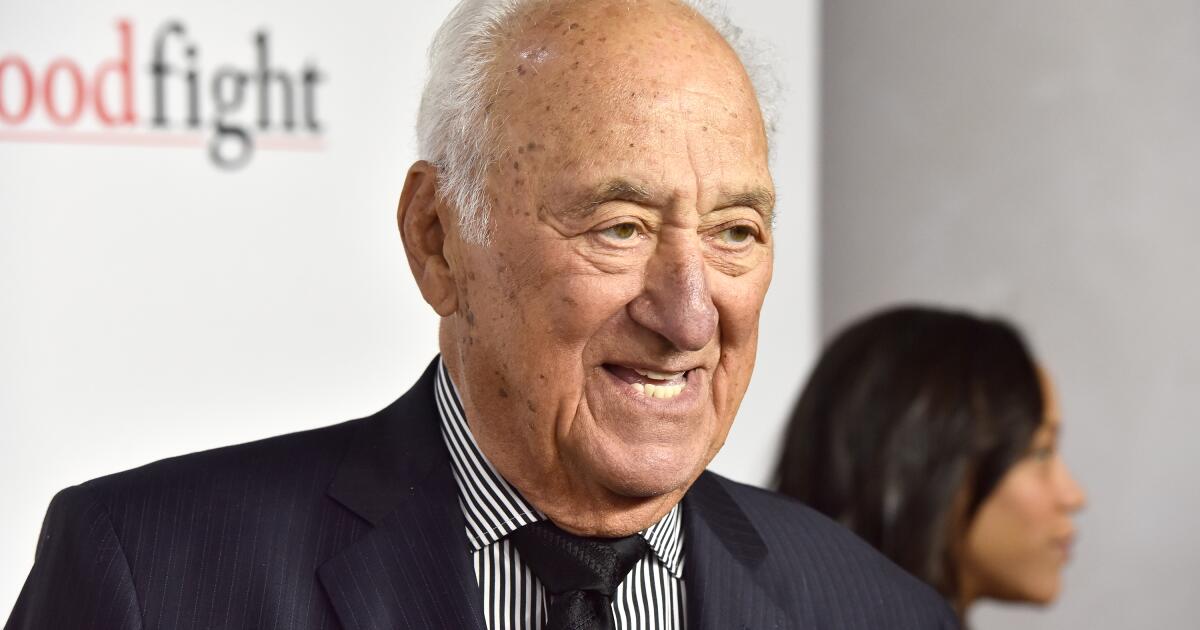Jerry Adler, ‘Sopranos’ and ‘Good Wife’ actor, dies at 96
Jerry Adler, who spent decades backstage on Broadway before reinventing himself in his 60s as a television actor, most memorably as Herman “Hesh” Rabkin on HBO’s “The Sopranos” and Howard Lyman on CBS’ “The Good Wife,” has died. He was 96.
Adler died Saturday in New York, where he lived, according to his family. A cause was not disclosed.
On “The Sopranos,” Adler played Hesh, a Jewish music producer and loan shark with long ties to the Soprano crime family. Not a member of Tony Soprano’s inner crew but close enough to be trusted, he was one of the few who could speak bluntly to James Gandolfini’s mob boss without fear of reprisal. Adler remained with the series from its 1999 pilot through the final season in 2007, a steady presence on the margins of Tony’s world.
Hesh turned up in some of the show’s most memorable arcs, helping Tony’s protégé Christopher and his girlfriend Adriana in their ill-fated stab at the music business, joining Tony in a horse-racing venture and, in the final season, watching their relationship sour when the boss pressed him for a large loan.
Steven Van Zandt, Adler’s “Sopranos” castmate and guitarist for Bruce Springsteen’s E Street Band, paid tribute to Adler on social media: “Such an honor working with you. Travel well my friend.”
While “The Sopranos” launched a number of previously little-known actors to instant fame, Adler’s rise was unusual, the culmination of more than four decades spent behind the scenes on Broadway before he ever stepped in front of a camera.
A Brooklyn native born Feb. 4, 1929, Adler began his career as an assistant stage manager in 1950 on “Gentlemen Prefer Blondes” and went on to work as stage manager, production manager or supervisor on more than 50 shows, including the original “My Fair Lady,” Harold Pinter’s “The Homecoming” and “The Apple Tree,” directed by Mike Nichols. He also directed several productions.
By the 1980s, he had moved to Los Angeles to be closer to his children and found steady work in daytime television as a stage manager. It wasn’t until his early 60s that acting entered the picture. After debuting on CBS’ “Brooklyn Bridge” in 1991, Adler found steady film and TV work as a character actor through the 1990s, appearing in Joe Pesci’s “The Public Eye” (1992) and Woody Allen’s “Manhattan Murder Mystery” (1993).
After “The Sopranos,” Adler remained a familiar presence on television. He joined “The Good Wife” in 2011 as Howard Lyman, a blustery, out-of-touch partner at the Lockhart/Gardner law firm. What was initially meant to be a one-off guest spot turned into a recurring role across six seasons, with Adler reprising the part in “The Good Fight” in 2017 and 2018.
Adler also recurred on FX’s “Rescue Me” as fire chief Sidney Feinberg and appeared in series ranging from “Northern Exposure” and “Mad About You” to “Transparent” and “Broad City.” His film credits include “In Her Shoes” (2005), “Synecdoche, New York” (2008) and “A Most Violent Year” (2014).
Adler returned to Broadway as a performer late in life, appearing in Elaine May’s 2000 comedy “Taller Than a Dwarf” and Larry David’s “Fish in the Dark” in 2015. Adler’s last screen credit came in the 2019 revival season of “Mad About You.” In 2024, he published a memoir, “Too Funny for Words: Backstage Tales From Broadway, Television, and the Movies,” reflecting on his unusual path through show business.
On Instagram, “Sopranos” co-star Michael Imperioli, who played Christopher, praised Adler as “a fantastic actor and the kindest of human beings. He brought so much humor, intelligence and truth to the role of Herman ‘Hesh’ Rabkin and was one of my favorite characters on ‘The Sopranos.’ I loved working and spending time with Jerry. A true class act.”
Survivors include his wife, Joan Laxman, whom he married in 1994, and his daughters, Alisa, Amy, Laura and Emily.

